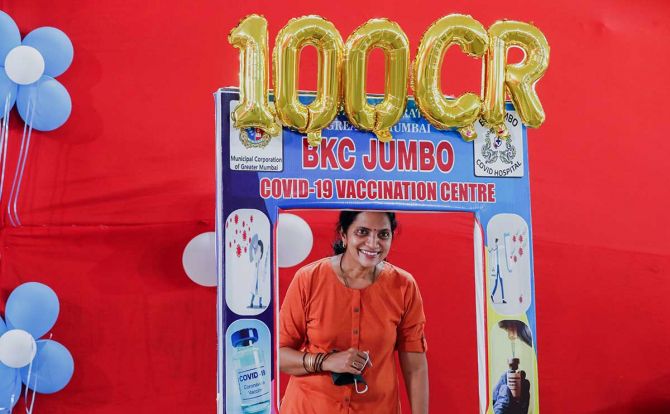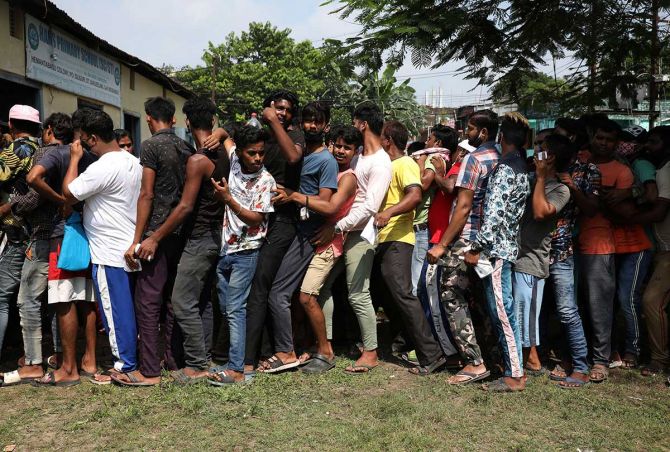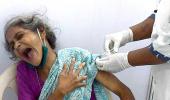'The immune protection may well wane somewhat, and that's what we have to monitor.'
'Should it wane to the point where vaccinated individuals are getting severe disease, then we really will need to give them booster shots and that'll apply regardless of what vaccine they've got the first time.'

A billion vaccine doses have been administered in our nation.
And many monuments have been lit up in India to celebrate this.

Since each of us needs two doses to be fully vaccinated, it follows that, after crossing the 1 billion mark, half a billion or 500 million people in India are fully vaccinated
Given that 41 per cent of India's 1.3 billion population is below 18 years of age and not eligible for a vaccine, if you do the mathematics, it means 267 million people are left to be vaccinated with two doses.
If we do now require boosters, we need to wait, because it is vitally more important that those who have not been vaccinated get their shots, so India's general immunity and COVID-19 transmission rates come down throughout the country.
But COVID-19 vaccines -- unlike say a measle vaccine or a polio vaccine -- do not guarantee lifelong immunity and are relatively less foolproof.

In a recent article in The Wall Street Journal, Dr Rustom Antia said: 'A really good vaccine makes it so someone does not get infected even if they are exposed to the virus. But not all vaccines are ideal.'
Dr Antia, Samuel C Dobbs Professor at the department of biology, Emory University, Atlanta, and its affiliate faculty, Emory Vaccine Centre, explains to Vaihayasi Pande Daniel/Rediff.com, the mostly pluses and the innocuously tiny minuses of the current crop of vaccines against COVID-19.
The work of Professor Antia, who earned his qualifications from IIT-Bombay, the University of Massachusetts, Amherst, and at Imperial College in London, focuses on pathogen-host interactions and immune responses. He also studies the development of pathogens and the advent of new infectious diseases, like COVID-19.

Colin Powell's death sort of suddenly puts a spotlight on the occasional failure of COVID-19 vaccines. Vaccines generally protect you against contracting severe COVID-19 disease in most cases.
So, was General Powell part of the small percentage, who went under the radar or did he not get a booster on time? I know it is hard to comment on a specific case, but...
I have no idea about that. The coronavirus vaccines over here are extraordinarily effective compared to any vaccines we've had in the past.
There's always a small fraction of individuals, for some reason, who don't get protected. It can be for all sorts of reasons, including other factors affecting the health of the person etc.
I'm a sort of mathematical biologist and I really don't know the details of the particular case and why in that particular individual, the vaccine didn't prevent them from getting (severe disease).
Yes, it's hard to comment specifically. But does General Powell's death build a strong case for the requirement for boosters, especially in people who are immunocompromised?
I would be very hesitant to draw any conclusion without knowing two things:
The first is the details of that case. And the second is doing the statistics at the population level.
When we are plying vaccines at the population level, you're looking for something and there will almost always be some exceptions to what happens. Almost nothing in this in the world is perfect. And vaccines are certainly included in that category.
At the population level, these vaccines have been extraordinarily effective, both in the short term for preventing transmission and for a longer period.
We don't know how long it's going to provide fairly robust protection against getting severe disease, and that's what's potentially of more importance (to know).
But there is a sort of difference between these vaccines against COVID-19 and let's say a measles shot. Are vaccines for COVID-19 sort of more similar to flu shots, which one has to have every year?
And also, the second part of that question is: Is there a difference, in this respect between mRNA vaccines and other kinds of vaccines?
Lots of interesting things you've asked in that question. First of all, there are a number of different vaccines against SARS-CoV-2 (the virus that causes COVID-19) and not all of them are mRNA vaccines.
The others work -- at least some of them work -- very well, such as the one that's being made by the Serum Institute of India (Covishield) and is widely used in Britain as well. They work quite well. Very well.
There's no fundamental bit (that's better/superior) about mRNA vaccines versus others.
One of the advantages of mRNA vaccines is, in principle, it's possible to design and produce the vaccine relatively fast. And indeed, that's been the case over here.

And are vaccines against COVID-19 more like flu shots?
That's a wonderful question.
Measles is an infection for which you get lifelong protection. For the most part, you only get measles once in your life.
You either get measles, or you get vaccinated against measles. The vaccine is a live attenuated virus vaccine -- which means that (when you are vaccinated) it's a mild version of the measles you get. For the most part, you almost never get infected again. And that's true with natural infections of measles too. You get measles once in your life and then your immunity protects you for the rest of your life.
For influenza and for the circulating human coronaviruses, and there are four (common) circulating coronaviruses* (apart from COVID-19) in the population. So naturally, we get infected with these (common) coronaviruses many times in our life.
The same is likely to be true, even after vaccination, and certainly true after vaccination with an influenza vaccine. You're going to get infected again. The (latest) vaccine will give you protection against the circulating strain for influenza.
The reason the vaccine is so important for the new coronavirus (COVID-19) is that usually, the people who get infected, and where immunity builds up, is in the very young.
For the four circulating (common) human coronaviruses and even for SARS-CoV-2, infections of young individuals, typically under four or five years of age, are relatively mild.
And what probably happens -- we aren't sure because we don't have data on it for obvious reasons -- is that this immunity then provides protection not from individuals getting infected, but potentially from them getting a severe disease later on, when they get infected.
So, the circulating human coronaviruses we all get infected with when we're just very young children. And we get infected multiple times in our life.
The problem, potentially, with the new coronavirus (COVID-19) is we're getting the first infection -- many (or majority) people are getting it -- when they're old (older). And it's really more much more severe in the elderly than in the young.
So, vaccines are really, really useful, particularly in older individuals, because that's where the severe cases are.
And the vaccine works pretty well. In fact, I would say, for a rapidly-developed vaccine, it's extraordinarily effective.

Getting COVID-19 is very compatible to older people getting a different flu strain?
No, not really.
Getting different flu strains -- flu changes by two ways. By antigenic drift, which is the small changes which result in seasonal flu outbreaks. And these outbreaks usually cause relatively mild disease.
It is more severe in older individuals, but usually the disease is as bad as what happens when you get a completely new flu virus in the population.
And that, for example, happens when you get an antigenic shift (in the flu strain). And a completely new virus comes in.
One of the examples of that was when we had the Great Influenza epidemic of 1918. So, SARS-CoV-2 is more like that.
How are things going to get better with respect to vaccines?
In a recent article in The Wall Street Journal, you spoke about how in relation to vaccines there are three tiers of defence, which include full protection against infection and transmission, protection against serious illness and transmission and protection against serious illness only.
If vaccines are technically going to get better, or better with a booster, what will happen to these tiers of defence?
The first thing is, that's what we need to measure carefully.
But it seems likely that all three get boosted when you get a booster shot.
You're less likely to get infected.
If you do get infected, you'll get a milder infection and you'll probably transmit less.
All of them are enhanced by booster shots in principle.
What I don't understand is that the countries that have used mRNA vaccines are looking at boosters already, like the US and Israel.
But why is there no talk about boosters in the countries that have used non-mRNA, like the European Union countries, for instance?
We, of course, are not speaking of boosters in India yet, until more of our population is vaccinated.
So, (in connection with) getting a booster, particularly in the case of the new coronavirus (COVID-19), we have to learn by looking at what the data tells us. And we don't know for sure what's going to happen.
Israel, particularly, started giving people the vaccine very fast and very early, compared to other countries during the pandemic.
It looked like (now) the number of cases of people getting infected was going up (in Israel) -- though I'm not sure if it was the number of severe cases or deaths. They wanted to see if a booster would help.
Europe, and the people getting other (kinds of) vaccines, started vaccinating several months later. And we have to look at what the data over there (in Europe and countries getting non-mRNA vaccines) is saying. Are we seeing increases of severe infections in immunised adults? That's the key bit to monitor right.
All the vaccines, so far, seem to be protecting from severe illness in adults.
The immune protection may well wane somewhat, and that's what we have to monitor. Should it wane to the point where vaccinated individuals are getting severe disease, then we really will need to give them booster shots and that'll apply regardless of what vaccine they've got the first time.
*According the Centres for Disease Control and Prevention, the four common human coronaviruses are:
229E (alpha coronavirus) that causes the common cold
NL63 (alpha coronavirus) that causes upper respiratory tract infection.
OC43 (beta coronavirus) that causes the common cold
HKU1 (beta coronavirus) that causes upper respiratory tract infection.
And then there are two other human coronaviruses:
MERS-CoV that causes Middle East Respiratory Syndrome, or MERS.
SARS-CoV that causes severe acute respiratory syndrome, or SARS.
Feature Presentation: Ashish Narsale/Rediff.com










